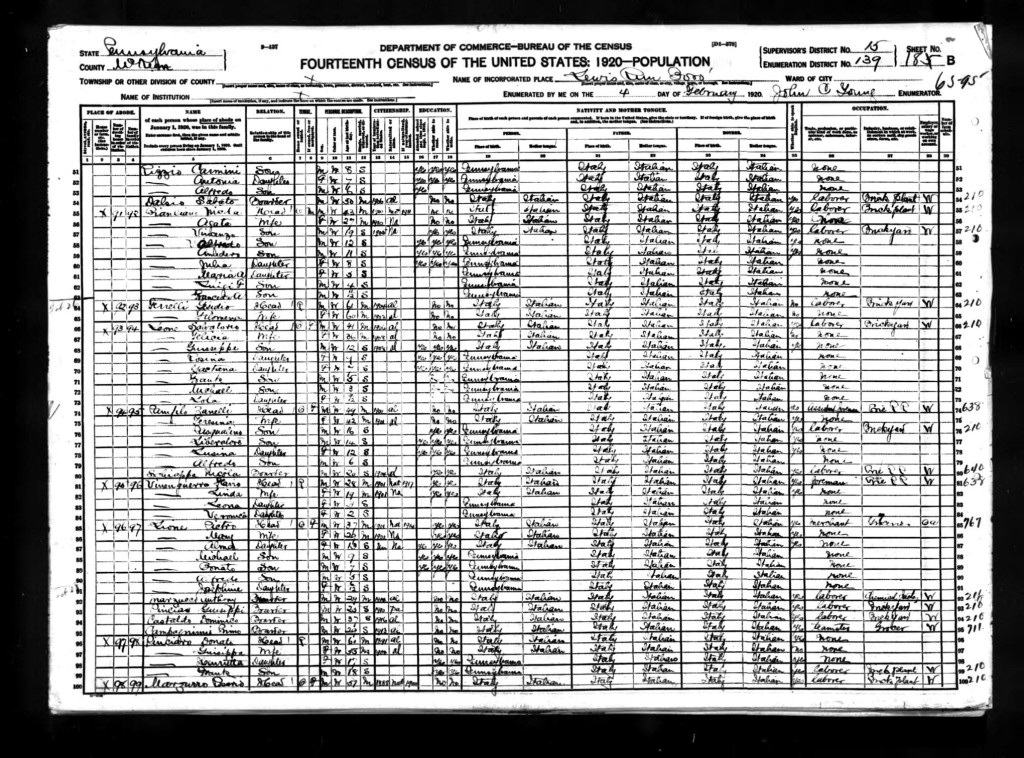Pinciaro Column: What’s in a name? It turns out, a lot

Say it with me: Cesidio Joseph Pinciaro III.
Having difficulty pronouncing my name? Join the club.
It’s OK. I’ve learned to live with it by now.
The first day of school was always awkward when the teacher would get to my name. It came to the point where I’d just raise my hand when she hesitated after reaching the “P” names. Employers have cocked their heads to the side when I’ve told them my given name. Telemarketers, insurance companies and bankers completely bungle it over the phone, not that they really care. Microsoft Word underlines my name with a red squiggle; no, it’s not a typo.
The list goes on.
My name is not easy to pronounce, it’s different and it’s a name most people have never even heard before. In fact, before coming to the News-Review and Suffolk Times, I’d never heard of anyone else outside of my family named Cesidio. As it turns out, however, I share a first name with our sales director’s great-grandfather.
But if my pregnant wife gives birth to a boy next month (we don’t know the gender), the world will soon know yet another Cesidio — Cesidio Joseph Pinciaro IV.
For someone who’s actually a fourth-generation American, having an outdated foreign family name is interesting, to say the least. As a kid, there were times I wanted a “normal” first name like my friends: Rob, Dave, Pat, Mark, Pat, Steve, Matt, Brian, Pat. Nobody really wants to be the different one on the first day of school, right?
As I grew up, though, I started to realize that different didn’t necessarily mean bad. In fact, it can be pretty cool. First off, it’s always a good talking point. I’ve told people “Cesidio” means “Chester” or “Charles” in Italian, fabricating stories for my own entertainment: “My relatives are big Chester Arthur fans.”
The foreign name gives me a bit of mystique, too, right? OK, maybe not. It’s nice to think it does though.
But more important, it’s a link to the past that I can’t escape and I’ll always have. Carrying the family name, it’s impossible for me to forget that my ancestors went through Lord-knows-what to get me and my family where we are today.
A few years back, I fished through Ancestry.com to try and get at least some clues of what my ancestors did actually go through. Some of what I found was amazing. On his passport, in fact, my great-grandfather Giuseppe Pinciaro lists his father’s name as Cesidio — something my grandfather never even knew.
“My father didn’t really know his father,” my Papa told me last week, and he didn’t talk about him much. Apparently my great-great grandfather drowned in a river when Giuseppe — who in a page straight out of a history book, came to America unable to speak English with $3.40 in his pocket — was 4 years old.
As I’ve considered the reality that I could have a son named Cesidio Joseph Pinciaro IV, I’ve found it worthwhile to look into the story behind the name myself.
From what I’ve found online, it seems to roughly translate from a Latin word meaning ‘bluish-green,’ pointing possibly to eye color. Fittingly, all three Cesidio Joseph Pinciaros have blue eyes.
The name gained particular popularity in the late 1800s in a central, more rural region of Italy called Abruzzo. That’s where my great-grandparents, Giuseppe and Crocafissa Pinciaro, came from. Giuseppe was born May 15, 1894, in Pettarano sul Giuzio — which today has about 1,300 people. Six years after my great-grandfather’s birth, a priest born about an hour away from him named Cesidio Giacomantonio was killed during the Boxer Rebellion in China on a mission trip, according to Catholic.org. Many people in the region — one of the poorer parts of the country — apparently took to honoring their local martyr by naming children, businesses and the like after him.
St. Cesidio Giacomantonio was later canonized by Pope John Paul II, along with 119 other missionaries who died in China from the mid-1600s to the mid-1900s. My grandfather said that in the city of Sulmona, Italy, signs for restaurants and other buildings to this day can still be found to be named after St. Cesidio.
One of the many things I’ve realized during my wife’s pregnancy is that naming a human being can carry quite a lot of pressure. Who knew? And I’m not very good at naming things. I’ve never named my cars, my fantasy sports team names are always so-so and, luckily, our dogs already had names when my wife and I adopted them.
It’s good to know that at least if we have a boy, the kid will have a name we’ll be able to be proud of — even if he has to suffer through some awkward first days of school.
And if it’s a girl? You’ll have to ask my wife. Cesidio Joseph Pinciaro IV is pretty much a lock for a son, so she’ll get to choose a name for a daughter.








